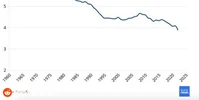https://old.reddit.com/r/europe/comments/1fal385/the_eus_births_hit_record_low_with_38_million/


The great replacement of Eurocucks can't come soon enough.
- 140
- 65
Top Poster of the Day:

 FourthCarvedPumpkin
FourthCarvedPumpkin


Current Registered Users: 27,896



40% Vaxxed
33% Infected
CURRENT EVENTS:
Homoween
rDrama's traditional holigay celebration!Marsey's Spooktacular Art Contest
Draw a homoween marsey!Find Rightoid Infighting
Marseybux reward per post!Drama: any incident, scene, gaffe, rumor, opinion, or disagreement that is blown entirely out of proportion.
Do your part to keep our community healthy by blowing everything out of proportion and making literally everything as dramatic as possible.
Rules:
- Asking to see who saved comments/posts=1 day ban
- You must be 18 or older to view this site.
- NO RIGHTWING AGENDAPOSTING.
- Discord users will be banned on sight.
- Don't post anything illegal.
- No sexualizing minors, even as a joke. This includes cartoons.
- No doxxing.
- Using alts to game dramacoin will get you banned.
- Supporting free speech is an immediate ban.
- Absolutely NO anti-CCP sentiment.
- Absolutely NO homophobia, transphobia or furphobia.
- Absolutely NO misgendering.
- Absolutely NO antisemitism.
- Absolutely NO vaccine misinformation.
- You are encouraged to post drama you are involved in.
- You are encouraged to brigade in bad faith.
- You are encouraged to gaslight, to gatekeep, above all else, to girlboss.
- You are encouraged to egg people on to transition or otherwise make drastic life changes.
- This site is a janny playground, participation implies enthusiastic consent to being janny abused by unstable alcoholic bullies who have nothing better to do than banning you for any reason or no reason whatsoever.
Related subreddits:
𝐜𝐚𝐫𝐩 𝐰𝐨𝐳 𝐞𝐫𝐞
Live commit: 4946005


Jump in the discussion.
No email address required.
Plummeting fertility rates will come for every single country this century
Jump in the discussion.
No email address required.
It's coming for the Asian countries, including India which will reach its max population and then decline while not truly developing most of its populace enough to survive the ensuing elderly population bomb.
It'll come for African countries too, most of which will see a similar growth and decline that India saw except even more harrowing. Although this is harder to predict since this is further into the future and African geopolitics is crazy unpredictable.
Jump in the discussion.
No email address required.
It's already hitting most of Latin America as well, and very hard. South America is sub-replacement and it will be an aged continent with a declining population as early as 2050.
It will take longer for Africa but it will happen. Even considering political instability, when did war and instability made people more fond of having children? Especially now they're getting access to birth control.
The post WW2 baby boom of North America and Europe was an incredible, one-time anomaly so far.
Jump in the discussion.
No email address required.
War will cause baby booms once they're over because development gets set back.
Jump in the discussion.
No email address required.
For most of history wars have caused the opposite of Baby Booms. The Fertility rate in Europe post WW1 never recovered to pre-war levels, for instance Germany had a TFR of 4 in 1914, it dropped to 1.5 in 1918 and then back to 3 by 1920 only for it to decline below 2.1 in the early 30s, regardless of the small boost it never again rose to pre-WW1 numbers.
That's what makes the post WW2 baby boom a huge unexplained anomaly. Also, the country with the highest TFR during the Baby Boom were the US and Canada, countries unaffected by war despite a large participation sending troops.
Jump in the discussion.
No email address required.
Eh a lot of that was the fertility rate going down during industrialization though.
Jump in the discussion.
No email address required.
No it wasn't. You're talking 1800s when you say "industrialization." It coincides with it, but it's a lagged effect.
Jump in the discussion.
No email address required.
Sure it was post-industrialization, but regardless it was the 1800s-onward boom in living standards that caused birth rates to decline.
I don't get how population increases after a devastating war doesn't happen. There's natural less education and less family planning so poors will just keep popping out babies. Unless there's some angle with women being needed to work more often and take up important positions previously held by men.
Jump in the discussion.
No email address required.
More options
Context
More options
Context
Yes but not as abruptly, it took 50 years for Germany's TFR to fall from 5 to 4, then it entered the mid 2s within the span of decade when the war kicked. And 1914 Germany was already industrialized. The contraceptive pill made this process much faster, Brazil fell from 6 to 1.8 in just 50 years (1960-2010 period) and it is currently at 1.45.
Jump in the discussion.
No email address required.
More options
Context
More options
Context
More options
Context
More options
Context
More options
Context
Well, kinda. India's government will feel it as hard as they've been subsidizing the elderly (and how much is that, twerp?). For them and China, it's a make-or-break moment.", so we'll see. Remember, government can drop pensions, adjust retirement age, and curtail all sorts of benefits as it pleases them. Especially China.
Same with Africa, but the elderly will fend more for themselves or with their families and die off sooner because those countries are poor, so they'll avoid much of this problem you're stressing about.
Jump in the discussion.
No email address required.
True the elderly will probably die off sooner than in the west.
Jump in the discussion.
No email address required.
More options
Context
More options
Context
More options
Context
More options
Context